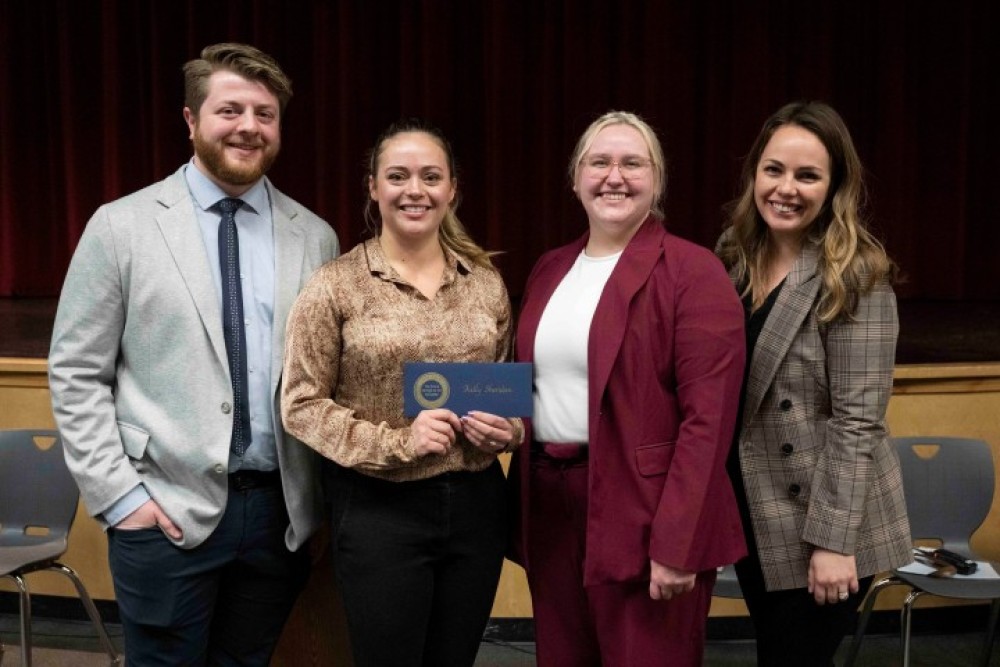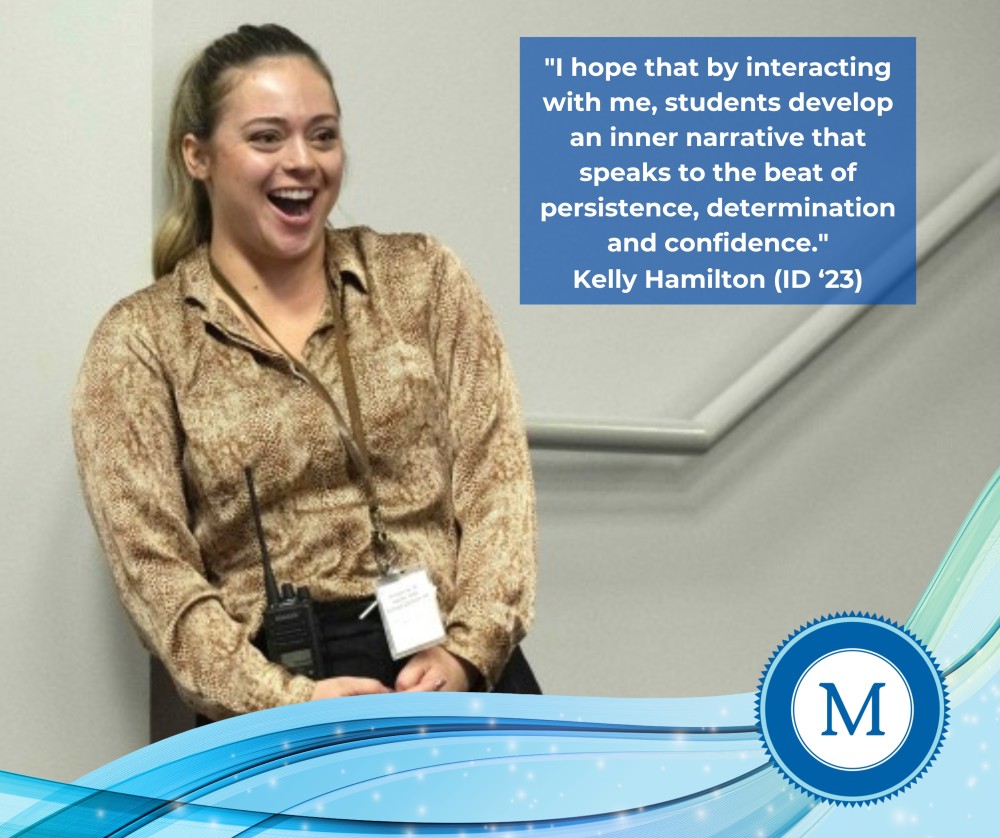Spotlight: Kelly Hamilton (ID '23)
October 16, 2024
Idaho Milken Educator Kelly Hamilton is a ninth through 12th grade assistant principal and dean of students at Compass Academy. As the school's former art teacher, Hamilton's creativity and positivity drive her passion for helping students and colleagues reach their highest potential. "I hope that by interacting with me, students develop an inner narrative that speaks to the beat of persistence, determination and confidence." Kelly Hamilton received a 2023-24 Idaho Milken Educator Award in Idaho Falls on February 21, 2024.
Milken Family Foundation: How have students responded since your Milken Educator Award surprise?
Students have been so supportive and kind! Many students gave me heartfelt congratulations. One thing that meant a lot to me was that I had a few alumni who reached out to congratulate me and express their gratitude. That meant volumes that they were still feeling connected to me and to our school.
One memory from the day I received my Milken Educator Award that I will never forget is when I was feeling overwhelmed and stepped into my office to collect myself before my interviews.. I took a deep breath and went back out towards the media frenzy. A student stopped me before I went back into the auditorium and said, "Ms. Hamilton, I knew they were going to say your name before they even said it." That validated and grounded me in the present so that I could enjoy the experience.

MFF: Who are your role models as an educator? Is there an experience you had in the classroom as a student that shaped your practices or motivation to teach?
As with many Milken Educators, I was inspired to push myself to be 10% bolder by my former principal and mentor, Shelly Smede. When I expressed interest in pursuing my educational leadership degree and a career in administration as a young teacher, she was generous with her advice and helped me build confidence. Eventually, we worked together as the administration team at my school, Compass Academy, which was an invaluable experience.
I was lucky to have teachers, professors, parents, and coaches that believed in me, challenged me, and taught me all throughout my life. These people, especially my high school art teacher and cross-country coaches, cared deeply about students as people. I think that's what makes a good teacher great. I don't think it's uncommon for students to have people like that in their lives. Every school building I have ever entered, whether it be a university or an elementary school, has incredibly genuine and thoughtful people who make positive impacts on students.
MFF: Tell us about your first year of teaching and/or administration. What memories stand out? Who or what helped you through it?
The emotion I remember the best from both my first year of teaching and my first year of administration is excitement. A first-year teacher has had quite a few guided teaching experiences by the time they get to their own classroom. It's very exciting to, for the first time, be the leader of your own classroom. You get to set the tone for the culture of the class which is one way in which teaching is very different from student teaching. I remember relying a lot on the other teachers in my building. I had an excellent mentor teacher, Holly Dasher, who I relied on a lot during my first year. I think that positively informed my practice as an administrator because I have a strong passion for supporting first-year teachers. Every year, I think about how I can help build the community and resources that are so vital to a positive experience as a first-year teacher. I have new ideas for the next school year that I am very excited about!
MFF: What do you hope students remember from their time with you?
I hope students remember that I am someone who unwaveringly believes in their potential to do great things. If a student struggles to see that in themselves, I hope that they see that I earnestly believe in them. I hope that by interacting with me, they develop an inner narrative that speaks to the beat of persistence, determination and confidence.
MFF: You’ve combined your passions for art and education at Compass Academy. Can you tell us more about your inspiration to infuse art into core curricula? What benefits have you observed from this approach in terms of student engagement and academic achievement?
Compass Academy is a project-based learning school. Students demonstrate their knowledge through real-world applications, and their final projects are often creative and enable student voice and choice. Some of the culminating projects include a marketing campaign, design showcase, pop-up museum, short film night and carnival.
MFF: What are your favorite family outreach events and community partnerships you have organized, and how do these initiatives contribute to building strong connections between the school, families, and the community?
Every year I organize a "Project Expo Showcase" in the winter. Every teacher in the building invites a few students in each of their classes to develop a display that showcases what they are learning in the class. The displays are far more than posters — we've had students demonstrate dissections, interactive science and art installations, chemistry labs, mini-art experiences, collaborative math problem-solving, Rube Goldberg machines, improv comedy shows, culinary taste-tests, historical reenactments, and more. The cool thing about this event is that teachers invite students who are not typically the student who receive academic accolades to represent the class. It's a great way to show investment in all students and showcase project-based learning to our community.
MFF: What advice would you share with people who are interested in becoming teachers?
Teaching is one of the few careers in which you get as much out of it as you put into it. You will change people's lives, and they will change your life in ways you would never expect. The appreciation and fondness that your students feel for you, their teacher, is unlike any experience you will have working in industry that doesn't have an ingrained component service. Children are so giving with their joy. It is infectious to be around it.
MFF: What advice do you have for new teachers?
My best piece of advice for new teachers is to be intentional about finding the best, most positive teachers in the school and befriend them. These types of teachers will be very generous in sharing with you. Visit their classrooms and watch them teach. You don't have to create everything from scratch. There are people in your building who will do classroom management, instruction, assessment, parent communication, and data collection very well. Pull the best ideas from the best teachers. They will view it as a compliment and your competence will increase quickly.
MFF: Are you working on any interesting initiatives or new projects these days? Is there anything else you want to share about your school?
The nature of Compass Academy is that we embrace change and are always striving to be responsive to state, community, and national needs. It's exciting to work at Compass because we attract teachers and students that have a proclivity for reinvention and chance. One of the new initiatives we're working towards is moving to a standards-based grading system. I'm really excited about this shift because the focus is on student proficiency rather than task completion or compliance. Standards-based grading is, I believe, the direction of the workforce and higher education. There's no longer a numbers game to play with grading. The game is attaining knowledge and demonstrating that knowledge of the standards. It's a very exciting initiative to be a part of!
I am also working on developing mentorship programs in high school fine arts programs. In our district, there are not opportunities for elementary students to have theater, arts, or music instruction on a consistent basis. I am developing a high school intensive arts program that has a component that utilizes high school students as fine arts mentors for elementary students. The goal is to build young students' exposure to art instruction while also developing older students teaching skills and service-minded attitudes.
Don’t miss any new articles and updates from Milken Educator Awards:


